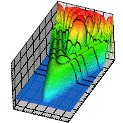Department of Physics and Astronomy: Publications and Other Research

Anthony F. Starace Publications
Document Type
Article
Date of this Version
5-30-2019
Citation
Published in Ultramicroscopy 205 (2019), pp 70–74.
doi 10.1016/j.ultramic.2019.05.013
Abstract
We show images produced by an electron beam deflector, a quadrupole lens and a einzel lens fabricated from conducting and non-conducting plastic using a 3D printer. Despite the difficulties associated with the use of plastics in vacuum, such as outgassing, poor conductivity, and print defects, the devices were used successfully in vacuum to steer, stretch and focus electron beams to millimeter diameters. Simulations indicate that much smaller focus spot sizes might be possible for such 3D-printed plastic electron lenses taking into account some possible surface defects. This work was motivated by our need to place electron optical components in difficult-to-access geometries. Our proof-of-principle demonstration opens the door to consider 3D-printed electron microscopes, whose reduced cost would make such microscopes more widely available. Potentially, this may have a significant impact on electron beam science and technology in general and electron microscopy in particular.
Included in
Atomic, Molecular and Optical Physics Commons, Elementary Particles and Fields and String Theory Commons, Plasma and Beam Physics Commons


Comments
Copyright © 2019 Elsevier B.V. Used by permission.